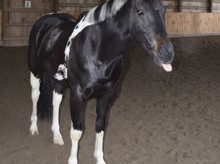Here in New England we have five seasons – summer, winter, spring and fall and MUD. Mud season is usually around March, but this year it’s come early. Of course, there’s a chance that we’ll have two mud seasons this year – everything could freeze up again, and then thaw once more.
This is what makes a mud season: snow on the ground, days of rain, temperatures warm enough for the snow to melt, but not enough sun to evaporate any of the puddles of water caught between the frozen ground and the few inches of mud above.
The chickens are happy to have something soft to scratch in, and they’re even out there in the rain. But, I worry about them more now than when the temperatures get well below freezing. It still gets really cold at night, and if they’re damp when they go to roost, they can get chilled and sick. This is the time of year when we lost our silkies and a Polish (that’s the type with the “hat” of feathers.) These breeds just don’t have the feather insulation of the sturdier breeds.
I also keep only clean-legged hens – none with feathers on their legs. I love cochins, but during mud season their leg feathers bring in the muck and get it all over the nesting boxes and eggs.
I know that some people cope by putting down wood chips to get the girls high and semi-dry, but we’ll just muddle through here at Little Pond Farm. (Bad pun, sorry!!)
Candy, by the way, does NOT like mud. There’s still a pile of snow in her yard, and you’ll find here there, sitting on the top, keeping her paws clean and pretending to ignore the hens.
The dogs, of course, love mud season. The dirt smells great! I’ve got a towel by the door and they are trained to let me wipe them off before coming in. Which helps a little.
The weather forecast is for rain the next five days, interspersed with snow showers. I’ve got my polka-dot mud boots by the door.
Stay warm and dry!
